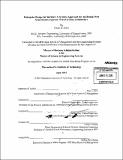| dc.contributor.advisor | Deborah J. Nightingale and Charles Fine. | en_US |
| dc.contributor.author | Silva, Hector E | en_US |
| dc.contributor.other | Leaders for Global Operations Program. | en_US |
| dc.date.accessioned | 2010-10-12T17:57:45Z | |
| dc.date.available | 2010-10-12T17:57:45Z | |
| dc.date.copyright | 2010 | en_US |
| dc.date.issued | 2010 | en_US |
| dc.identifier.uri | http://hdl.handle.net/1721.1/59171 | |
| dc.description | Thesis (M.B.A.)--Massachusetts Institute of Technology, Sloan School of Management; and, (S.M.)--Massachusetts Institute of Technology, Engineering Systems Division; in conjunction with the Leaders for Global Operations Program at MIT, 2010. | en_US |
| dc.description | Cataloged from PDF version of thesis. | en_US |
| dc.description | Includes bibliographical references (p. 72). | en_US |
| dc.description.abstract | Typically a company's second largest controllable expense, corporate travel affects many employees at Boeing. A challenge when implementing improvements in the travel and expense system, which is actually comprised of a system of systems, is the coordination of various solutions to ensure improvements in one area do not adversely affect the efficiency of other areas. Various systems along with the people, policies, and processes used to provide services to travelers must be coordinated both inside and outside Boeing in order for overall travel operations to function properly. The intent of this project is to establish a systems-based architecture for Boeing's Next Generation Travel System. This thesis proposes re-designing the Boeing travel system using an enterprise architecting framework to select a future state architecture for a service organization. The analysis recommends a supplier integrated "off-the-shelf' software solution, employing the software as a service business model. Under this model the supplier is paid per transaction completed in the system; adoption of this metric aligns the system to reduce re-work costs, increase first-time pass quality, and improve usability. Additionally, new supplier software tools will allow the Boeing travel organization to transition from a process-focused to a more knowledge-focused service team. | en_US |
| dc.description.statementofresponsibility | by Hector E. Silva. | en_US |
| dc.format.extent | 72 p. | en_US |
| dc.language.iso | eng | en_US |
| dc.publisher | Massachusetts Institute of Technology | en_US |
| dc.rights | M.I.T. theses are protected by
copyright. They may be viewed from this source for any purpose, but
reproduction or distribution in any format is prohibited without written
permission. See provided URL for inquiries about permission. | en_US |
| dc.rights.uri | http://dspace.mit.edu/handle/1721.1/7582 | en_US |
| dc.subject | Sloan School of Management. | en_US |
| dc.subject | Engineering Systems Division. | en_US |
| dc.subject | Leaders for Global Operations Program. | en_US |
| dc.title | Enterprise design for services : a systems approach for the Boeing next generation corporate travel system architecture | en_US |
| dc.type | Thesis | en_US |
| dc.description.degree | S.M. | en_US |
| dc.description.degree | M.B.A. | en_US |
| dc.contributor.department | Leaders for Global Operations Program at MIT | en_US |
| dc.contributor.department | Massachusetts Institute of Technology. Engineering Systems Division | |
| dc.contributor.department | Sloan School of Management | |
| dc.identifier.oclc | 659780743 | en_US |
